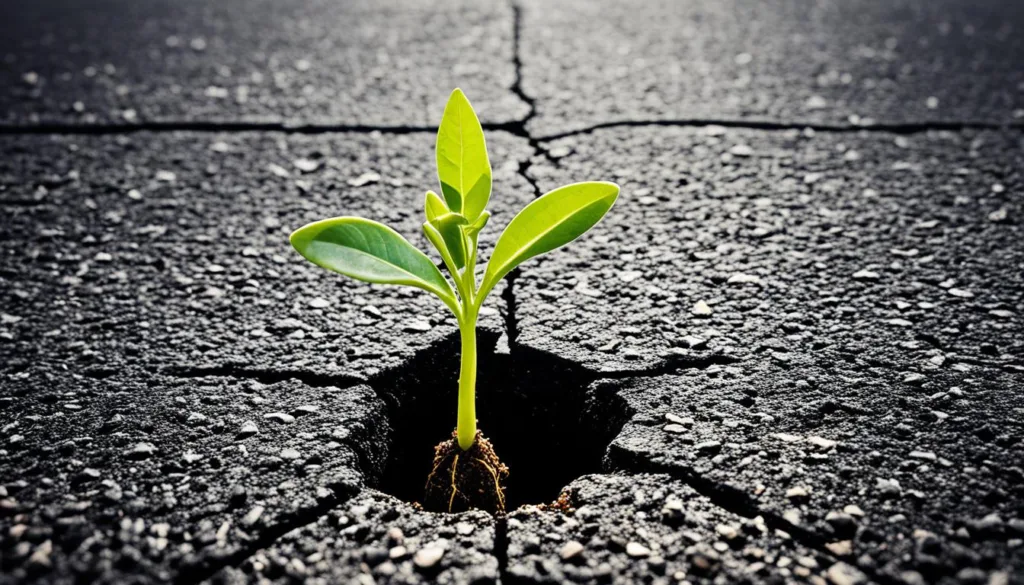Imagine for a moment you’re caught in the midst of a storm—life’s winds are howling, challenges ricochet around you like hail, and it appears as if there’s no end in sight. This may not just be a visualization exercise; it might resonate deeply with your current experience. In these times, when the waves of adversity threaten to sweep us off our feet, your psychological health becomes your lifeline. You seek strength, not just to survive, but to emerge from the turmoil stronger—more robust in your capacity to face down the next storm. Overcoming challenges is less about brute force and more about the finesse of the human spirit. It is in this crucible that we discover our true mettle, our strength in crisis.
But, how do you ignite the smolder of resilience within when everything feels bleak? The answer lies in a subtle shift of perspective—a conscious decision to nurture the very qualities that scaffold psychological well-being and fortitude in the harshest of conditions. It’s in the compassionate embrace of your struggles, the determination to apply the best resilience techniques, and the unwavering belief that personal growth is born of hardship. Here, between these lines, we equip you for the journey, a step-by-step guide to not only weathering the storm but dancing in the rain.
Key Takeaways
- Nurturing psychological health is crucial for cultivating resilience.
- The finesse of overcoming challenges lies in the resilience of the human spirit.
- Strength in crisis emerges from a subtle shift in perspective and determination.
- Resilience is a skill honed through experience and the application of targeted resilience techniques.
- Personal growth often finds its roots in the fertile soil of adversity and challenge.
The Essence of Resilience in Adversity
Resilience is not only your shield in the battle against adversity but also the very sword that carves your path through it. Your mental fortitude—the inner strength that is both refined and revealed in challenging times—is the key to resilience building. This section delves into the quintessential strategies that bolster your ability to cope with adversity, ensuring that you don’t merely endure, but you emerge stronger and more prepared for life’s twists and turns.
Every challenge faced is a lesson waiting to be learned, and understanding how to navigate through these tough times is crucial for adversity coping. It involves more than just a passive bearing of hardship; it’s an active process of self-development and emotional skill-building.
When we meet with adversity, our reactions determine our capacity to overcome it. Choose to respond with resilience and watch yourself grow in power and poise.
Here are some strategies to integrate into your daily life to enhance your resilience:
- Maintain a positive mindset: Positivity isn’t about ignoring the negative, but rather about harnessing hope to propel yourself forward.
- Develop emotional toolkit strategies: These are your go-to practices for keeping your emotions in check, like deep-breathing, meditation, or engaging in physical activity.
- Build supportive relationships: Connect with those who uplift you and understand the value of mutual support and encouragement.
| Strategy | Purpose | Benefit |
|---|---|---|
| Mindfulness Practice | To build awareness and stay rooted in the present moment. | Minimizes stress and anxiety, fostering a calm and composed state of mind. |
| Goal Setting | To provide direction and a sense of purpose. | Enhances motivation, gives a measure of progress, and fosters feelings of achievement. |
| Reflection and Journaling | To process experiences and document growth. | Promotes self-awareness and helps in identifying personal resilience patterns. |
Incorporating these practices into your lifestyle is essential for mental fortitude and resilience. It’s not about shutting out the bad, but about transforming it into fuel for your journey of personal growth. Prepare to rise, rebuild, and realize your potential, starting today.
Recognizing Your Innate Capacity for Resilience
Your journey to personal resilience isn’t just about facing external challenges; it’s about understanding and harnessing your own history of overcoming adversity. This journey is inherently personal and can profoundly impact your psychological health. You are not just born with a fixed amount of resilience; it’s something you can develop and strengthen over time with the right resilience techniques.

Personal resilience is your ability to bounce back from stressors and challenges. It’s fueled by experiences from your past and the confidence you’ve built through them. By reflecting on these episodes of personal resilience, you develop a deeper trust in your capacity to overcome obstructions in the future.
Reflecting on Personal Trials and Triumphs
When you look back at the challenges you’ve encountered and triumphed over, you’re not just reminiscing; you’re reinforcing the core belief that you are capable and strong. This stocktaking of victory lends itself to a compendium of resilience techniques you’ve unconsciously developed and can turn to when facing new adversities.
The Science Behind Psychological Health and Resilience
Scientific understandings of psychological health and resilience emphasize the role of cognitive processes, like the adoption of a ‘growth mindset.’ This concept encourages the view that qualities can be developed through dedication and hard work, turning the idea of fixed traits on its head. By framing obstacles as chances to evolve, you’re not just coping—you’re transforming.
| Resilience Technique | Benefits for Psychological Health | Application in Personal Resilience |
|---|---|---|
| Mindfulness and Meditation | Reduces stress, improves focus and clarity. | Use to center yourself before tackling a problem. |
| Growth Mindset Development | Encourages an attitude of learning and growth from experiences. | Shift from seeing failures as end-points to viewing them as growth opportunities. |
| Gratitude Practices | Enhances well-being, improves relationships. | Helps acknowledge the positive outcome of past challenges. |
| Problem-solving training | Increases the ability to manage and resolve conflicts effectively. | Apply in situations that require critical thinking and creative solutions. |
By building on these practices, you fortify your resilience while nurturing your psychological health, equipping yourself with an internal toolkit that will serve you in all aspects of life. Remember, your personal resilience is not just a quality you possess; it’s a dynamic force that you can cultivate and grow.
Transforming Obstacles into Opportunities for Growth
Personal resilience isn’t about avoiding adversity; it’s about facing it head-on and using it as a springboard for development. You possess an innate ability to convert challenges into opportunities for growth, fortifying your resilience. It’s time to strengthen your capacities for resilience building and developing strategies that allow you to adapt—and thrive—despite life’s inevitable hurdles.

Embracing a Growth Mindset
You’re more adaptive than you might realize. By adopting a growth mindset, you’re telling yourself that every obstacle presents an opportunity for self-improvement. This doesn’t just apply to personal development; it’s a powerful approach in your professional life too. Whether it’s learning a new skill in response to a job setback or deepening your relationships after personal trials, these experiences all contribute to your story of overcoming challenges.
Strength in Crisis: Shifts in Perspective
When crisis strikes, it’s your perspective that will make all the difference. A shift from viewing setbacks as failures to treating them as setups for future success can redefine the way you approach life’s challenges. This reengineering process encourages the kind of innovative thinking and adaptive behavior at the heart of strength in crisis. Through this lens, you’re not just getting through difficulties; you’re actively cultivating your personal resilience with each step forward.
It’s crucial to remember that the journey of resilience is continuous. It doesn’t stop at the first sign of success. Each challenge you overcome is a milestone, not a finish line. You’re in the driver’s seat—steer towards the path of lifelong growth and watch as your personal resilience becomes an unshakable force within you.
Strategies for Emotional Wellness and Recovery
Embarking on the path to emotional recovery is a dynamic and deeply personal journey that necessitates unwavering commitment to your mental health. It’s a crucial component of adversity coping and ties directly into the broader quest of resilience building. As you navigate through life’s inevitable ebbs and flows, embracing strategies that promote emotional wellness is tantamount to safeguarding your psychological fortitude.
Mindfulness, for instance, plays a pivotal role in emotional regulation. It’s about being present in the moment, acknowledging your feelings without judgment, and gaining clarity amidst chaos. Alongside mindfulness, journaling offers a release—a safe haven to express thoughts and emotions, uncensored and unfiltered. Indeed, such reflective practices empower you to discern behavioral patterns and trigger points, thus equipping you with insights to manage stress and build coping mechanisms. Furthermore, injecting your daily routine with activities that bring joy plays a seminal role in uplifting your spirits and providing much-needed reprieve.
Crafting a support network filled with individuals who understand your experiences and offer diverse perspectives is fundamental. They serve as pillars, offering comfort during tumultuous phases and celebrating your victories—no matter the scale. The shared wisdom across this collective—whether from family, friends, or mentors—carries the weight of lived experience, fostering not only encouragement but also tangible advice for overcoming adversities. By intertwining these various threads, you create a tapestry of support mechanisms working in concert to bolster your resilience and ability to rise above challenges with grace and fortitude.
FAQ
What is psychological health and how does it relate to resilience?
Psychological health is a state of well-being where individuals realize their own abilities, can cope with the normal stresses of life, work productively, and contribute to their community. It’s closely linked to resilience as a fundamental aspect that enables individuals to deal with difficulties, build strength in crisis, and bounce back from adversity.
How can you cultivate resilience during tough times?
Cultivating resilience involves developing mental fortitude to overcome challenges. This can be achieved through various resilience building practices such as maintaining a positive outlook, establishing a strong support network, and employing specific coping mechanisms like mindfulness or cognitive restructuring during times of stress.
Can experiencing adversity actually make you stronger?
Yes, facing and overcoming challenges can build strength in crisis and contribute to personal growth. Adversity coping involves learning from difficult situations, which can foster resilience and a deeper understanding of one’s capabilities and psychological health.
What are some effective resilience techniques for dealing with personal challenges?
Effective resilience techniques include maintaining a positive mindset, practicing self-care, setting realistic goals, seeking support, and applying problem-solving skills. Engaging in regular physical activity, connecting with others, and learning stress management can also enhance personal resilience.
How can reflecting on past trials and victories improve resilience?
Reflecting on past personal trials and triumphs helps in recognizing your innate capacity for resilience. This reflection bolsters self-belief and provides tangible evidence of your ability to handle challenges, thus reinforcing psychological health and resilience.
What scientific concepts support the building of resilience?
Concepts such as the “growth mindset,” which focuses on embracing challenges as opportunities to learn and develop, support resilience building. Understanding that traits like psychological health and personal resilience can be developed rather than being fixed traits, empowers individuals to actively work on enhancing their resilience.
How does embracing a growth mindset contribute to resilience?
Embracing a growth mindset is key to transforming obstacles into opportunities for growth. It encourages seeing difficulties as catalysts for learning and self-improvement, rather than insurmountable problems, thereby promoting resilience and overcoming challenges.
What does it mean to have strength in crisis?
Having strength in crisis means possessing the mental fortitude to confront and navigate through difficult situations effectively. It involves using adaptive coping strategies, drawing upon personal resilience, and maintaining a growth mindset to manage and overcome the adversity encountered.
What strategies support emotional wellness during tough times?
Supporting emotional wellness requires strategies that foster emotional balance and recovery. This can include practices such as mindfulness, cognitive-behavioral techniques, connecting with loved ones, and prioritizing self-care to ensure that your psychological health remains intact during challenging periods.
How important is a support network in building resilience?
A strong support network is vitally important for building resilience. Having people to turn to for advice, encouragement, and empathy can provide emotional support, practical help, and a sense of belonging, all of which are crucial for maintaining psychological health and overcoming adversity.

